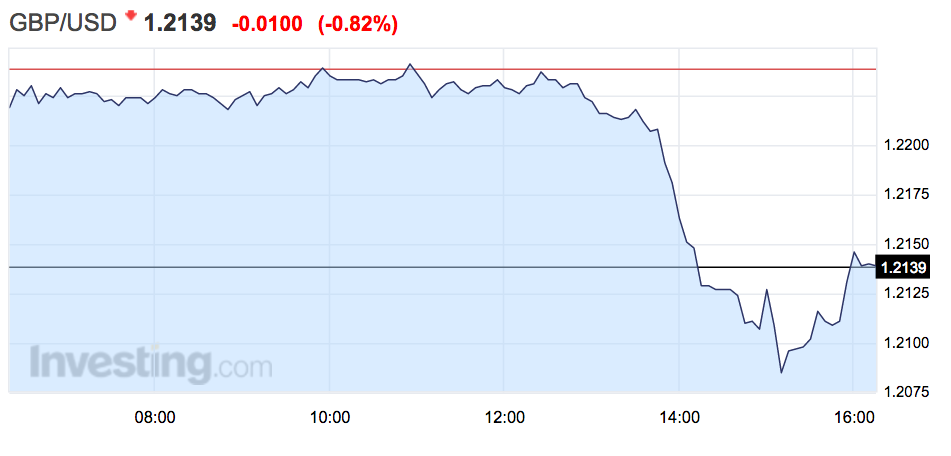The pound fell off a cliff
Sterling dropped ike a stone on Tuesday afternoon.
After a fairly sanguine morning for the currency, around 12.50 p.m. BST (7.50 a.m. ET) the pound began to drop sharply against the dollar.
Sterling fell below $1.21 for the first time in several weeks just before 4.00 p.m. BST (11.00 a.m. ET), before pulling back as Bank of England Governor Mark Carney appeared in front of the House of Lords Economic Affairs Committee to give the committee an update on the progress of monetary policy in the UK. Topics included the BoE's response to the UK's Brexit vote, and whether Carney will leave his post in 2018, or stay for a full term until 2021.
Here's how the pound's movements look as of 4.40 p.m. BST (11.40 a.m. ET):

Investing.comCommenting on the move prior to Carney's appearance, Alexandra Russell-Oliver of Caxton FX said in an emailed statement:
"Sterling has dropped, partially as a result of pressure on the pound ahead of Carney’s testimony this afternoon and partially due to dollar strength following above-forecast housing data. There is the risk of further sterling weakness/volatility during Carney’s testimony, which will focus on the economic consequences of the Brexit vote."
Earlier on Tuesday, Chancellor Philip Hammond told the House of Commons that he sees "no reason" why he would necessarily reject any future requests from the Bank of England for further quantitative easing.
Sterling's crash in recent weeks has been well documented, and has led to comparisons between the UK's economy and that of emerging market nations.
Both Morgan Stanley and Citi argued that Britain is becoming an emerging market in notes on Friday, while HSBC has argued that the pound is now a political football that currency traders are using as a proxy vote for possible Brexit policies.
NOW WATCH: Here’s what happens when interest rates go negative
See Also:
SEE ALSO: Here are the biggest movers in Britain's markets on Tuesday

 Yahoo Finance
Yahoo Finance 
